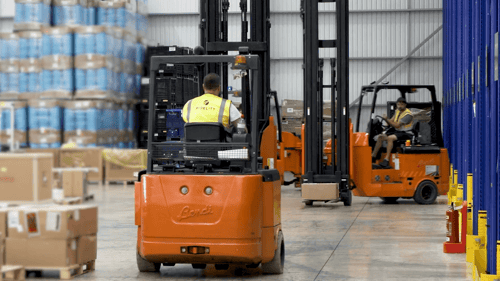What Is A Fulfilment Company?
 A fulfilment company is a third-party agent responsible for fulfilling customer orders. They take charge of getting the goods from the warehouse shelves into the hands of the people who ordered them.
A fulfilment company is a third-party agent responsible for fulfilling customer orders. They take charge of getting the goods from the warehouse shelves into the hands of the people who ordered them.
Outsourced fulfilment companies fulfil an order by picking the item from its location in the warehouse, packing it securely, and shipping it to its final destination. Sometimes, delivery of the product isn't the end of the fulfilment journey: if an item is returned, a fulfilment company will handle that, too.
What services does a fulfilment company provide?
A fulfilment company takes care of every aspect of the order fulfilment process, so that when an order is placed, the seller doesn’t need to do a thing. Typical fulfilment services include:
- Warehousing – storing the goods in an appropriate location
- Inventory management – keeping track of stock levels and maintaining a good supply of merchandise at all times
- Picking and packing – getting the right items from the shelves and getting them ready for shipping
- Shipping – managing the product’s journey from the warehouse to the customer
- Returns management – handling returned goods, processing refunds, carrying out quality checks and sending out replacement items
How does the fulfilment process work?
Although the basic principle behind the fulfilment process is simple – getting goods from one location to another – doing this efficiently requires expertise.
The right fulfilment company will understand the inner workings of the fulfilment process and how you can get the best, most economical results, with minimal waste. This will include key strategies to save time and money at every stage of the process.
What are the advantages of using a fulfilment company?
With the right fulfilment partner, you are likely to benefit from a streamlined fulfilment process which has a number of business advantages:
- An optimised warehouse layout. The design of your warehouse can make a real difference to how your goods are processed. Logical and practical item locations based on the frequency of orders will speed up the fulfilment process significantly. And making the best use of space means you can fit more stock in, reducing the frequency and cost of deliveries made to your warehouse.
- Efficient picking. The best fulfilment companies can get the goods off the shelves in the shortest amount of time, thanks to a well-planned picking process. They may use machines to do the picking, or human pickers may work in assigned zones, so that they don’t have to move all over the warehouse.
- Improved inventory management. With a better understanding of your stock levels and sales patterns, many fulfilment companies will ensure that you have exactly the right volume of goods in stock to fulfil your orders, without the risk of empty shelves or overstocking.
- Better customer service. Fulfilment companies can handle everything from order tracking to returns management, keeping customers informed of the latest movements and letting them know when they can expect their parcel. With software to track every stage of the fulfilment process, it’s easy to monitor and communicate status updates and ensure that your customers are happy.
- Faster delivery. Fulfilment companies can ensure that your goods are stored in the best locations to ensure swift delivery to your customers, wherever they are in the world.
- Room for growth. With an outsourced fulfilment company you can add extra capacity as and when it’s needed. So you can be confident that your customers will still get the service they deserve, even when demand goes up.
How much do fulfilment services cost?
The cost of fulfilment services can be broken down into:
- Setup fees and account management. These are charged by some fulfilment companies, to cover the cost of handling your business account.
- Receiving. This covers the cost of receiving goods into the warehouse.
- Storage. This could be charged by volume or per pallet.
- Picking and packing. Different pricing models may charge by order or by hours worked.
- Shipping fees
- Return costs
On top of this, fulfilment companies may charge additional fees depending on any other services you may require, like kitting or customer service.
Fulfilment costs can be calculated as a cost per order, or a percentage of your overall sales income. Visualising the cost per order will help you to see how much you are spending on getting each product to its destination, while calculating the percentage you are spending on fulfilment services will tell you what impact they’ll have on your profits. As with most business costs, the price of per unit will go down as the volume you are dealing with goes up – meaning that your fulfilment costs will be a lower proportion of the retail price, when you have a larger number of items to sell.
Actual costs will also vary depending on a whole host of other factors:
- the size and weight of your products
- whether they need any special storage or handling
- how far the product has to travel to its destination
- whether you are shipping by air or sea freight.
Whatever the cost, it’s clear that fulfilment is an essential business expense. (Just try running an e-commerce site without it!) But it’s good to know that with the right fulfilment company, the money you spend is used to make your fulfilment process as streamlined as possible, while offering the best experience for your customers.
Fulfilment services from Fidelity
Fidelity provides e-commerce fulfilment services tailored to your needs. From warehousing and inventory management to global shipping, we’ll take care of everything you need to get your orders fulfilled cost effectively and on time.
Ready to find out more? Contact us today.
.webp?width=459&height=121&name=Site-Logo_Retina-Logo-Wht%20(1).webp)
Comments